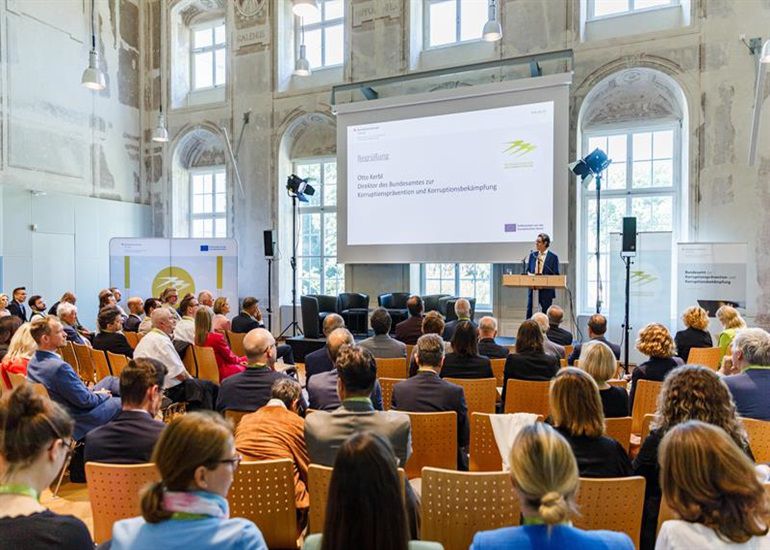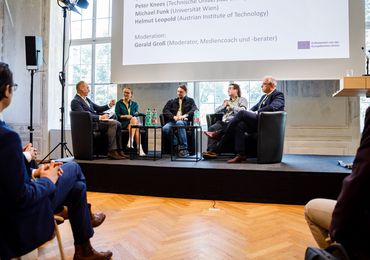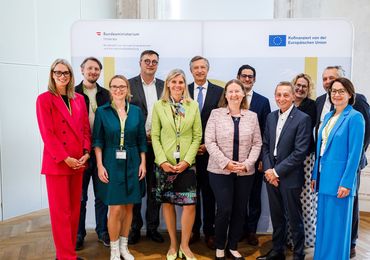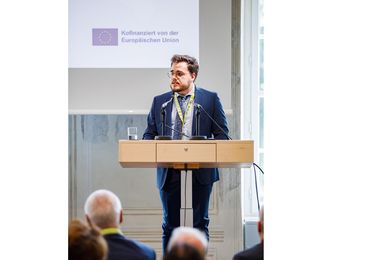Anti-Corruption Day 2024: AI as a game changer for integrity and compliance?
Austrian Anti-Corruption Day with the theme “Machine vs. morality” - Integrity and compliance as a framework for the use of artificial intelligence.

The Austrian Anti-Corruption Day 2024 of the Federal Bureau of Anti-Corruption (BAK), which took place on May 15, 2024 at the Josephinum in Vienna, focused on questions of morality and ethics in connection with artificial intelligence (AI). A total of 150 participants from the public sector attended the high-caliber event.
Morals and ethics play an important role in connection with artificial intelligence. Mathias Vogl, Head of Section at the Ministry of the Interior, and Otto Kerbl, Director of the BAK, emphasized this at the start of the event. In his opening speech, Vogl said: “Morality, ethics, integrity and compliance are the essential factors that we can and must use to set the framework for the use of artificial intelligence.”
This is also confirmed in the Austrian AI strategy (Artificial Intelligence Mission Austria 2030) and the “AI Act” passed by the European Parliament in March. At the same time, these are also “the best prerequisites for preventing corruption. The influence AI can have on integrity and compliance is therefore of great importance for the BAK’s prevention work,” said Otto Kerbl.
AI and Society: Revolution for Work and Society
Author, historian and journalist Philipp Blom took a critical look at the topic in his keynote speech. Under the title “The ghosts I called. AI and society", he pointed out the challenges that artificial intelligence could pose to society: ”The AI revolution is changing our societies because it is creating a new category: intelligent things. This revolutionizes not only human work, but also social relationships, personal perceptions and world views. Only history can show whether this is compatible with democracy as a forum for responsible, informed citizens.”
During a high-profile panel talk, university experts Verena Dorner (Vienna University of Economics and Business), Peter Knees (Vienna University of Technology), Michael Funk (University of Vienna) and Helmut Leopold (Austrian Institute of Technology) shed light on various aspects of the development of democracies under the influence of AI.
Artificial Intelligence - Witchcraft or Magic Formula?
Sabine Köszegi, member of the AI Advisory Board of the Austrian Federal Government and Chair of the UNESCO Advisory Board on the Ethics of Artificial Intelligence, outlined a possible use of AI in public administration.
With the question “Witchcraft or magic formula?”, she took a human-centered perspective and emphasized: “In the public debate, AI technology is often presented as an inevitable development, a wave that is rolling over us that we have to learn to live with. However, I don’t see what role we, the people, play or could play in its development. AI technology - like all other technologies - is a cultural artifact and therefore the result of our own ideas. We need to talk about this: Who should benefit from this technology, what do we want to use it for and how do we need to design it so that we can realize our ideas?”
Under the moderation of Bettina Knötzl, President of the Advisory Board of Transparency International Austrian Chapter, Gabriele Bolek-Fügl (CEO Compliance 2b), Michael Wiesmüller (Head of the Department of Digital and Key Technologies for Industrial Innovation, Federal Ministry for Climate Action, Environment, Energy, Mobility, Innovation and Technology), Günter Horniak (Head of the Public Management course at FH Campus Wien) and Klaus Steinmaurer (Managing Director of the Telecommunications and Postal Services Department at RTR - Rundfunk und Telekom Regulierungs-GmbH) discussed the opportunities and risks of using AI in public administration.
During a break, Thomas Kolb, doctoral student from TU Wien, gave a live demonstration of a practical example of AI. He summarized the opinions submitted as part of a legislative process and thus showed the possibilities, limits and dangers of AI.




